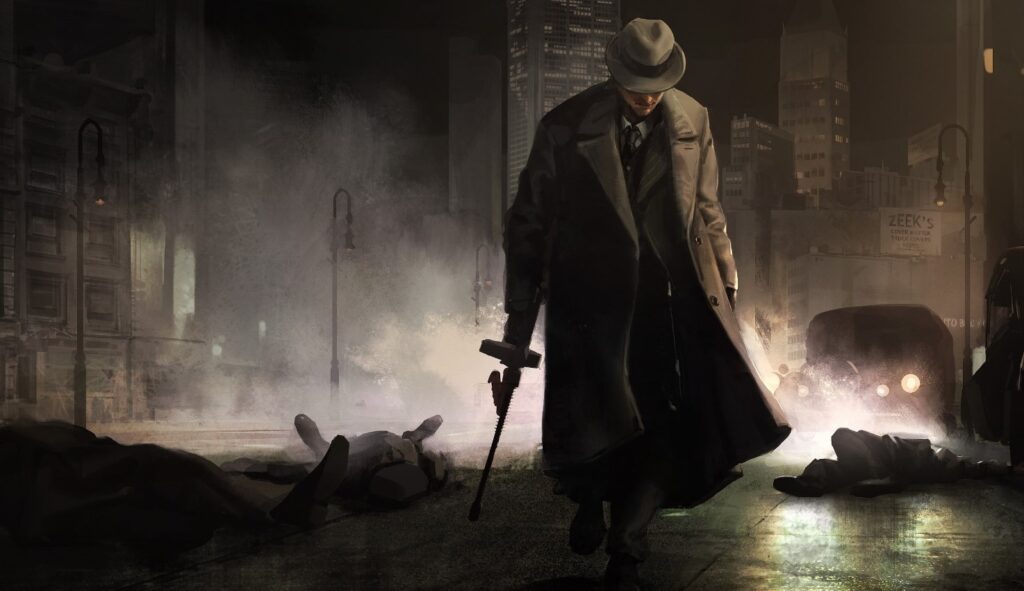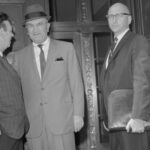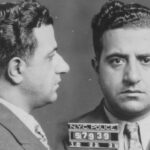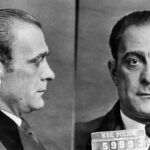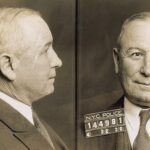Salvatore Maranzano, born in the coastal town of Castellammare del Golfo in Sicily in 1886, crossed the Atlantic with ambitions that would forever alter the landscape of organized crime in America. His Sicilian upbringing provided him with a strong sense of loyalty and a ruthless approach to power dynamics, traits that would serve him well in the criminal underworld of Prohibition-era America.
The Prohibition Era – A Land of Opportunity
The Roaring Twenties in America were a paradoxical blend of liberation and constraint. Jazz music filled the air, flappers defied social norms, and the stock market soared. Yet, the Volstead Act had ushered in Prohibition, turning the legal taps of alcohol dry. This paradox created a fertile ground for organized crime, and Salvatore Maranzano was among those who capitalized on this societal contradiction.
Maranzano’s bootlegging operation was not a simple, small-scale endeavor. He orchestrated a complex supply chain that involved international connections, corrupt law enforcement officials, and a fleet of vehicles specially modified for smuggling. His operation was a masterclass in logistics and risk management. The alcohol often originated from Canada or the Caribbean, bypassing U.S. authorities through a series of covert routes on land and sea. Once the contraband reached American soil, a network of drivers, known as “rum-runners,” took over. These drivers were skilled at evading the police, navigating through hidden roads and often using cars equipped with souped-up engines and secret compartments.
But Maranzano’s genius lay not just in the mechanics of his operation. He also had an uncanny ability to read the market. He understood the tastes and preferences of his clientele, often providing high-quality Scotch or French wine to affluent customers, while supplying cheaper, domestic spirits to working-class neighborhoods. This segmentation strategy maximized profits and solidified his reputation as a reliable supplier in a market fraught with substandard goods.
The Castellammarese War – A Battle for Supremacy
The criminal underworld of the 1920s and ’30s was not a place for the faint-hearted. It was a volatile environment, teeming with alliances and rivalries that could change at the drop of a hat. Salvatore Maranzano, with his eyes set on becoming the dominant force in this chaotic landscape, found himself in a life-or-death struggle with Giuseppe “Joe the Boss” Masseria. The Castellammarese War, as this conflict came to be known, was not just a battle for territory; it was a clash of ideologies and a fight for the soul of the Italian-American mafia.
Maranzano was a strategist, often likened to a military general for his meticulous planning and disciplined approach to warfare. He employed a variety of tactics, from targeted assassinations to full-blown shootouts, to weaken Masseria’s hold on various rackets. His soldiers were fiercely loyal, trained in the art of stealth and armed with the latest weaponry. They operated under a strict code of conduct that emphasized loyalty, secrecy, and ruthless efficiency.
Yet, the war was also a public relations battle. Maranzano understood the importance of perception in the world of organized crime. He cultivated relationships with key figures in the media, ensuring that his exploits were covered in a manner that painted him as a Robin Hood-like figure, fighting against a corrupt and oppressive system. This narrative helped him gain public sympathy, making it difficult for law enforcement agencies to build a strong case against him.
Masseria, on the other hand, was more of a traditionalist, sticking to old-world methods that were becoming increasingly obsolete. His inability to adapt to the changing dynamics of organized crime in America made him vulnerable, and Maranzano exploited this weakness to the fullest. The war culminated in a series of events that saw Masseria’s empire crumble, paving the way for Maranzano to claim the title of “boss of all bosses.”
The Rise to Power – Eliminating Joe the Boss
Salvatore Maranzano’s ascent to the apex of the criminal underworld was a calculated series of moves that would make even a chess grandmaster envious. The elimination of Giuseppe “Joe the Boss” Masseria was not merely a power grab; it was a strategic maneuver that involved intricate planning, subterfuge, and alliances that would later prove to be double-edged swords. Charles “Lucky” Luciano, a rising star in the criminal firmament, was Maranzano’s co-conspirator in this endeavor. Luciano, who was part of Masseria’s inner circle, was disillusioned with the archaic practices that hindered the mafia’s growth. He saw in Maranzano a visionary who could bring the organization into the modern age.
The collaboration between Maranzano and Luciano was a study in contrasts. Maranzano was a seasoned mobster with a penchant for classical history, while Luciano was a pragmatic young man who understood the pulse of contemporary America. Together, they orchestrated a coup that would be talked about for generations. The plan involved Luciano inviting Masseria to a dinner, a setting where guards were lowered and wine flowed freely. It was here that Masseria met his end, betrayed by his own lieutenant. The message was clear: the old guard was being replaced, and Maranzano was the new face of power.
A New Order – The Five Families and Beyond
With Masseria out of the way, Maranzano wasted no time in implementing his vision for a new mafia order. Inspired by the hierarchical structure of ancient Rome, he divided the existing criminal enterprises into five distinct families. Each family was to have its own set of responsibilities, territories, and revenue streams, all under the overarching authority of Maranzano himself. This was a radical departure from the loosely organized, often chaotic syndicates that had existed before.
But Maranzano’s vision was not without its critics. Meyer Lansky, a key figure in the Jewish underworld, was particularly vocal in his opposition. Lansky represented a new breed of gangster, one who was not bound by ethnic loyalties and saw the potential for alliances across cultural lines. Maranzano’s refusal to collaborate with non-Italians was not just an ideological stance; it was a business decision that many saw as short-sighted. The tensions between the Italian and Jewish factions were palpable, and Maranzano’s insistence on maintaining ethnic purity within the ranks was a divisive issue that would have far-reaching consequences.
The Downfall – Betrayed by His Own
Maranzano’s reign, although groundbreaking in many ways, was fraught with internal strife. His autocratic leadership style did not sit well with the younger, more progressive elements within the mafia. Luciano, who had once been an instrumental ally, began to see Maranzano as an obstacle to the mafia’s evolution. The ideological rift between the two men widened, culminating in a series of events that would spell the end for Maranzano.
Aware of the growing discontent, Maranzano took steps to protect himself. He enlisted the services of Vincent “Mad Dog” Coll, a notorious hitman with a reputation for ruthlessness. The plan was to eliminate Luciano before he became an insurmountable threat. But Luciano was always one step ahead. Using his extensive network of informants within law enforcement, he got wind of Maranzano’s plans. On September 10, 1931, a group of hitmen disguised as tax agents entered Maranzano’s plush Park Avenue office. Within minutes, Maranzano was dead, his dreams of a Roman-inspired mafia empire dying with him.
Maranzano’s downfall was not just the result of external pressures or the changing landscape of organized crime; it was also a consequence of his own actions and decisions. His inability to adapt, to forge alliances outside his comfort zone, and to recognize the changing tides led to his undoing. It was a tragic end for a man who had once stood on the brink of unparalleled power, and a stark reminder of the transient nature of authority in the volatile world of organized crime.
The Aftermath – A Legacy in Crime and Culture
Following Maranzano’s death, the title of “boss of all bosses” was abolished, and power was distributed among the mafia families to prevent future conflicts. Joseph Bonanno, Maranzano’s protégé, took over his operations and established the Bonanno crime family, which remains one of the most notorious criminal organizations to this day. Maranzano’s life and deeds have also been immortalized in various forms of media, from Mario Puzo’s ‘The Godfather’ to the TV series ‘Boardwalk Empire’.
Final Thoughts
Salvatore Maranzano was a complex individual whose ambitions were both his driving force and his downfall. His attempts to centralize power within the mafia led to innovations in organized crime but also sowed the seeds of his demise. His life serves as a cautionary tale about the perils of unchecked ambition and the volatile nature of power in the criminal underworld.

